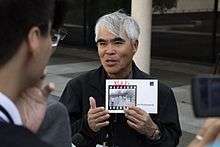Nick Ut
| Nick Ut | |
|---|---|
 | |
| Born |
Huỳnh Công Út March 29, 1951 Long An, Vietnam |
| Residence | Los Angeles, California |
| Other names | Nick Ut |
| Citizenship | American |
| Occupation | Photojournalism |
| Notable credit(s) | Pulitzer Prize-winner |
| Children | 2 |
Huỳnh Công Út, known professionally as Nick Ut (born March 29, 1951) is a Vietnamese American photographer for the Associated Press (AP) who works out of Los Angeles. He won both the 1973 Pulitzer Prize for Spot News Photography and the 1973 World Press Photo of the Year for "The Terror of War", depicting children in flight from a napalm bombing.[1] In particular, his best-known photo features a naked 9-year-old girl, Phan Thị Kim Phúc, running toward the camera from a South Vietnamese napalm attack on North Vietnamese troops at the Trảng Bàng village during the Vietnam War.[2] On the 40th anniversary of that Pulitzer Prize-winning photo in September 2012, Ut became the third person inducted by the Leica Hall of Fame for his contributions to photojournalism.[3] On March 29, 2017, he retired from AP.[4]
Biography

Born in Long An, Vietnam, Ut began to take photographs for the Associated Press when he was 16, just after his older brother Huynh Thanh My, another AP photographer, was killed in Vietnam. Ut himself was wounded three times in the war in his knee, arm, and stomach. Ut has since worked for the Associated Press in Tokyo, South Korea, and Hanoi and still maintains contact with Kim Phuc, who now resides in Canada.
Before delivering his film with the Kim Phúc photo, he took her to the hospital. The publication of the photo was delayed due to the AP bureau's debate about transmitting a naked girl's photo over the wire:
...an editor at the AP rejected the photo of Kim Phuc running down the road without clothing because it showed frontal nudity. Pictures of nudes of all ages and sexes, and especially frontal views were an absolute no-no at the Associated Press in 1972...Horst argued by telex with the New York head-office that an exception must be made, with the compromise that no close-up of the girl Kim Phuc alone would be transmitted. The New York photo editor, Hal Buell, agreed that the news value of the photograph overrode any reservations about nudity.— Nick Ut[5]
In September, 2016,[6] a Norway newspaper has published an open letter to Mark Zuckerberg after censorship was imposed on this photography placed on the newspaper's Facebook page.[7] Half of the ministers in the Norwegian government shared the famous Nick Ut photo on their Facebook pages, among them prime minister Erna Solberg from the Conservative Party (Høyre). Several of the Facebook posts including the Prime Minister’s post were deleted by Facebook,[8] but later that day Facebook decided to allow the photo.[9]
Nixon connection
Audiotapes of then-president Richard Nixon in conversation with his chief of staff, H. R. Haldeman, show that Nixon doubted the veracity of the photograph, musing whether it may have been "fixed."[10] Following the release of this tape, Ut commented:
"Even though it has become one of the most memorable images of the twentieth century, President Nixon once doubted the authenticity of my photograph when he saw it in the papers on June 12, 1972.... The picture for me, and unquestionably for many others, could not have been more real. The photo was as authentic as the Vietnam war itself. The horror of the Vietnam war recorded by me did not have to be fixed. That terrified little girl is still alive today and has become an eloquent testimony to the authenticity of that photo. That moment thirty years ago will be one Kim Phuc and I will never forget. It has ultimately changed both our lives."— Nick Ut[11]
Family and later career
Ut is a United States citizen and is married with two children. He lives in Los Angeles, and remains an AP photographer. His photos of a crying Paris Hilton in the back seat of a Los Angeles County Sheriff's cruiser on June 8, 2007 were published worldwide; however, Ut was photographing Hilton alongside photographer Karl Larsen. Two photographs emerged; the more famous photo of Hilton was credited to Ut despite being Larsen's photo.[12]
References
- ↑ Spot News Photography". The Pulitzer Prizes. Retrieved 2013-11-13.
- ↑ Lucas, Dean. "Famous Pictures Magazine - Vietnam Napalm Girl". Retrieved 2013-06-02.
- ↑ Vimeo, Leica Portrait: Nick Ut - Leica Hall of Fame Award 2012
- ↑ "'Napalm Girl' photographer retires after 51 years". Winston-Salem Journal. Associated Press. 2017-03-29. Retrieved 2017-03-30.
- ↑ Horst Faas and Marianne Fulton. "How the Picture Reached the World". Retrieved 2007-06-02.
- ↑ https://www.washingtonpost.com/news/the-intersect/wp/2016/09/09/abusing-your-power-mark-zuckerberg-slammed-after-facebook-censors-vietnam-war-photo/
- ↑ Norway newspaper aftenposten, Dear Mark. I am writing this to inform you that I shall not comply with your requirement to remove this picture. Espen Egil Hansen, 09 September 2016
- ↑ Norway newspaper aftenposten, Norway's prime minister and several government members censored by Facebook Kristin Jonassen Nordby, 09 September 2016
- ↑ I want to share some thoughts about expression... Facebook Retrieved September 13, 2016.
- ↑ Nixon, The A-Bomb, And Napalm By DAN COLLINS. February 28, 2002, 3:30 PM CBS
- ↑ From program booklet for Humanist Art/Symbolic Sites: An Art Forum for the 21st Century
- ↑ Photographer Karl Larsen sues ABC over Paris Hilton photo Harriet Ryan, Los Angeles Times January 20, 2009
External links
- Archival Video: Napalm Girl Kim Phúc on YouTube
- Nick Ut, Exactly 35 Years Later
- Nick Ut - Still a Photographer with the Associated Press Horst Faas and Marianne Fulton
- A return to Saigon - 4
- AP Career Retrospective for Nick Ut
- Hall of Fame Award Winners Leica Awards // World of Leica - Leica Camera AG archive